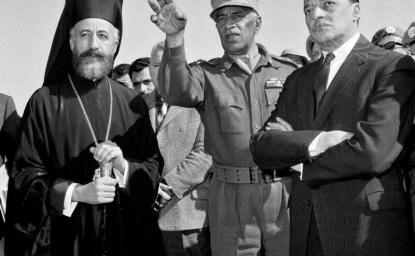The Romanian dissident movement in the 1970s and 1980s was both less well-known and markedly different from its counterparts in Czechoslovakia and Poland. On June 10 Mihail Neamtu, a Wilson Center Public Policy Scholar, discussed the case of Romanian intellectual Andrei Plesu who chose to exercise dissent by immersing himself in classical languages and culture and by withholding the benefits of his intellect from the state.
Upon his graduation in 1971 from the University of Bucharest with a degree in art history, Plesu was confronted with a crackdown on intellectual freedom in the form of dictator Nicolae Ceausescu's "July Theses" banning ‘cosmopolitanism' as well as capitalist artistic models.
To cope with this increasingly constrained intellectual environment, Neamtu explained, Plesu surrounded himself with like-minded mentors and friends and immersed himself in the study of classical philosophy, as well as renaissance art.
Plesu's growing expertise in these fields earned him the opportunity to study in West Germany from 1975-1977 and again from 1983-1984. Here he learned German and became acquainted with international politics as they were viewed outside Romania. As his prestige rose abroad, he faced constant pressure at home and was repeatedly demoted.
Following his return from Germany, Plesu began to focus on the "moral condition of Romanian intellectuals." His 1988 monograph Minima Moralia hypothesized that Romanian intellectuals had shirked their moral responsibility to oppose Ceausescu's regime by focusing on the natural sciences and thereby contributing to the communist leader's efforts to "modernize" Romania.
In 1988, Romanian poet Mircea Dinescu took a public stance (in Moscow) in support of Gorbachev's reforms and criticized Ceausescu's cult of personality and lack of respect for human rights at home. As the secret police and the state mobilized to silence Dinescu, (unsuccessfully) Plesu and several other intellectuals signed a letter decrying the abusive treatment of their peer. This dissident act earned him exile in a Moldovan village until the December 1989 ouster of Ceausescu.
Starting in 1990, Plesu combined his carreer as a professor of philosophy in Bucharest with public service, first as minister of culture in the first post-89 government led by Petre Roman, and then as foreign minister from 1997-1999.
Plesu's pre-1989 life prepared him for his unique dissident role after 1989, Program Associate Mircea Munteanu argued. An important voice for the intellectual and political modernization of Romania after the Revolution, Plesu actively participated in government and public life while other former dissidents, disenchanted with the resurgence of reformist communists in post-Ceausescu Romania, chose not to engage in public service.
Tim McDonnell and Mircea Munteanu
Edited by Christian Ostermann, Director, HAPP/WES
Related Links





